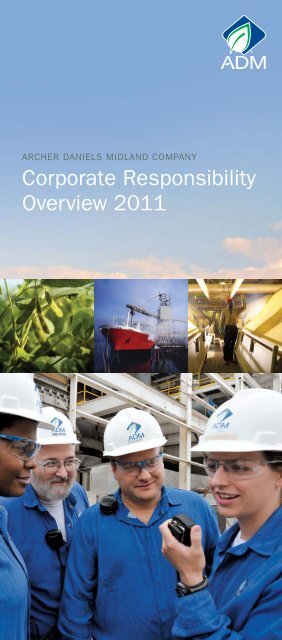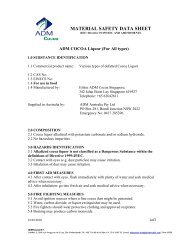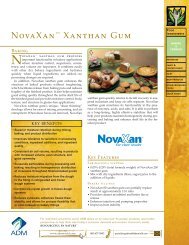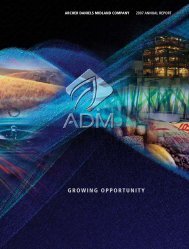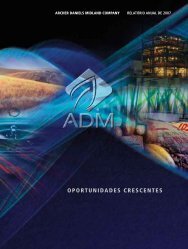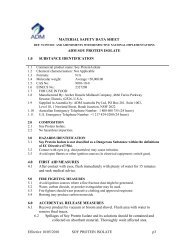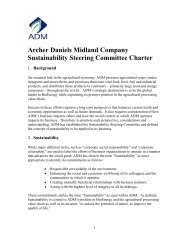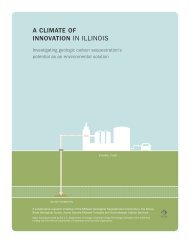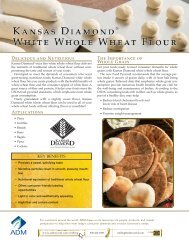PDF (1.4 MB) - ADM
PDF (1.4 MB) - ADM
PDF (1.4 MB) - ADM
You also want an ePaper? Increase the reach of your titles
YUMPU automatically turns print PDFs into web optimized ePapers that Google loves.
ARCHER DANIELs MIDLAND company<br />
Corporate Responsibility<br />
Overview 2011
ARCHER DANIELs MIDLAND company<br />
Serving<br />
vital needs<br />
responsibly<br />
A world whose population is headed<br />
toward 9 billion by the year 2050 is<br />
expected to require as much as twice<br />
the food and energy produced today.<br />
As one of the world’s premier agribusinesses<br />
and a leading producer of food and feed<br />
ingredients and renewable fuels and chemicals,<br />
<strong>ADM</strong> has an important role to play in serving<br />
these vital needs.<br />
To realize our vision of being the world’s most<br />
admired agribusiness, we are intent on creating<br />
value while growing responsibly. That’s why our<br />
30,000 colleagues are working to continuously<br />
improve our environmental performance,<br />
establish a sustainable supply chain for the<br />
crops we source, and ensure that our capital<br />
investments, social investments and<br />
investments in people help us fulfill our<br />
vital purpose.<br />
The highlights that follow represent some of<br />
<strong>ADM</strong>’s most important achievements toward<br />
these goals in 2011. To read the full report,<br />
visit www.adm.com/responsibility.<br />
1
Environmental stewardship<br />
Energy & emissions<br />
<strong>ADM</strong> committed to achieving, by 2020,<br />
15 percent reductions in energy use and<br />
emissions from 2010 levels on a per-unitof-production<br />
basis.<br />
The company continued to make progress<br />
toward reducing emissions at major U.S.<br />
processing plants as part of a 2003 agreement<br />
with the U.S. government and several state<br />
governments. <strong>ADM</strong>’s corn processing facilities<br />
reduced energy use 41 percent on a per-unitof-production<br />
basis between 2001 and 2011,<br />
while criteria emissions — including volatile<br />
organic compounds (VOCs), carbon monoxide,<br />
particulate matter and sulfur dioxide — have<br />
fallen 70 percent since 2002, largely through<br />
reductions in VOC emissions.<br />
<strong>ADM</strong>’s global oilseed crushing and refining<br />
operations reduced energy use by 4 percent<br />
in both 2010 and 2011, for a total savings<br />
of about 1 million megawatt hours.<br />
We continued to advance the development<br />
and implementation of a global Environmental<br />
Management System and a complementary<br />
Environmental Management Information<br />
System. When fully implemented, these<br />
systems will enhance <strong>ADM</strong>’s environmental<br />
management, risk mitigation and stewardship<br />
programs. In addition, a component of these<br />
systems will enable the company to monitor,<br />
track and report companywide energy and<br />
emissions performance.<br />
“Doing the right thing for<br />
the environment really has<br />
the potential to bring value<br />
back to the company.”<br />
– Dean Frommelt (left), division environmental<br />
manager, Corn Processing, shown here with<br />
Brad Crookshank, superintendent at the company’s<br />
Decatur, Illinois, wastewater treatment facility<br />
Criteria Emissions *<br />
<strong>ADM</strong> Corn Processing<br />
TONS/BUSHEL AVERAGE<br />
Energy Use<br />
<strong>ADM</strong> Corn Processing<br />
BTU/BUSHEL AVERAGE<br />
<strong>ADM</strong> continued to help advance two major U.S.<br />
carbon capture and sequestration projects at<br />
our Decatur, Illinois, corn processing complex.<br />
’02 ’03 ’04 ’05 ’06 ’07 ’08 ’09 ’10 ’01 ’02 ’03 ’04 ’05 ’06 ’07 ’08 ’09 ’10 ’11<br />
Criteria emissions fell<br />
70 percent between<br />
2001 and 2010<br />
Energy use on a per-unit-of-production<br />
basis fell 41 percent between<br />
2001 and 2011<br />
3<br />
*includes NO X<br />
, SO 2<br />
, CO, VOCs and particulate matter
Environmental stewardship<br />
Water & waste<br />
We committed to achieving, by 2020,<br />
a 15 percent reduction in water use and<br />
waste from 2010 levels on a per-unit-ofproduction<br />
basis.<br />
The company finished collecting one full year<br />
of water consumption and discharge data from<br />
approximately 120 plants responsible for up<br />
to 99 percent of <strong>ADM</strong>’s overall water use.<br />
Once this data is verified and validated, it will<br />
be used to develop water management plans for<br />
each of these facilities — plans that can enable<br />
the company to reach its 2020 target.<br />
<strong>ADM</strong> completed a year-long project at eight<br />
North American processing facilities to assess<br />
the effectiveness of a new waste management<br />
standard. The results will enable <strong>ADM</strong> to<br />
implement a global standard by the end of<br />
our 2012 fiscal year.<br />
“ Plant operators are coming<br />
to me with ideas and asking,<br />
‘Where can I reuse’ and<br />
‘How can I use less water’<br />
It’s gratifying.”<br />
– Jennifer Drumm, engineering advisor,<br />
<strong>ADM</strong> Research, and chairman,<br />
<strong>ADM</strong> Water Resource Management work group<br />
“ We’ve always tried to utilize every piece<br />
of every grain, seed and bean we can<br />
to minimize waste. Now, we’re taking<br />
our efforts to the next level.”<br />
– Mark Calmes, vice president, environmental,<br />
Office of Compliance and Ethics (right) with<br />
Linda Childers, environmental engineer<br />
5
SUPPLY CHAIN<br />
Cocoa<br />
<strong>ADM</strong>’s Socially and Environmentally<br />
Responsible Agricultural Practices<br />
program, or SERAP, reached more than<br />
22,000 farmers in Côte d’Ivoire, who together<br />
delivered approximately 24,000 metric tons<br />
of high-quality, responsibly grown cocoa.<br />
Since 2005, SERAP has provided more<br />
than US$10 million in grower premiums,<br />
US$4 million in seed money, and tens of<br />
millions of additional dollars in revolving funds<br />
to promote sustainable cocoa cultivation and<br />
better living standards for farmers and<br />
communities.<br />
<strong>ADM</strong> announced the expansion of the SERAP<br />
program to Indonesia, another important<br />
cocoa-growing nation.<br />
Following the civil conflict that impacted cocoa<br />
growers in Côte d’Ivoire for seven months in<br />
2010-11, <strong>ADM</strong> met with cocoa cooperatives<br />
to offer support in restoring production<br />
and marketing operations. An <strong>ADM</strong> team<br />
comprising agricultural engineers, marketing<br />
representatives and cocoa farming specialists<br />
traveled throughout the country, assessing the<br />
additional assistance cocoa farmers needed to<br />
resume full production.<br />
<strong>ADM</strong> has provided financial assistance to<br />
Opportunities Industrialization Centers<br />
International–Côte d’Ivoire (OICI-CI) to fund<br />
bridge and well construction projects in cocoafarming<br />
communities. The projects include the<br />
construction of 16 clean-water wells and eight<br />
small culvert bridges. Despite the delay caused<br />
by the civil conflict, four of the wells and six<br />
of the bridges had been completed as of<br />
Sept. 1, 2011. The remaining projects are<br />
slated for completion in 2012.<br />
“We need to have farmers<br />
focus on producing good<br />
cocoa, using good practices,<br />
so they can be more efficient.<br />
That’s how we will sustain<br />
the world’s cocoa supply.”<br />
– David Loue, agricultural product manager, <strong>ADM</strong> Cocoa<br />
(far right), shown here with Alain Fredericq (center,<br />
with trowel), director, global business development<br />
and sustainability, and with members of the<br />
cocoa co-op Anouazé d’Abongoua at a ceremonial<br />
groundbreaking for the co-op’s new warehouse in<br />
Côte d’Ivoire. The facility is being financed in part<br />
with funds from SERAP premiums provided by <strong>ADM</strong>.<br />
7
SUPPLY CHAIN<br />
Soy<br />
The first two phases of Doing it Right —<br />
a program developed by <strong>ADM</strong> and Aliança<br />
da Terra, a Brazilian sustainable agriculture<br />
group founded by farmers — were completed.<br />
Approximately 120 Brazilian soy producers<br />
from the state of Mato Grosso participated,<br />
and more than 380,000 hectares of <strong>ADM</strong><br />
suppliers’ farmland were mapped and<br />
assessed. Growers were then provided with<br />
assistance to help them transition to more<br />
sustainable farming practices. Doing It Right<br />
aims to help soy farmers improve yields<br />
and profits on existing land in socially and<br />
environmentally sound ways that can prevent<br />
the need to expand into ecologically<br />
sensitive regions.<br />
The company launched Phase 3 of Doing It<br />
Right, which will more than double the amount<br />
of farmland mapped and assessed in the<br />
first two phases by adding an additional<br />
400,000 hectares.<br />
<strong>ADM</strong> achieved the International<br />
Sustainability and Carbon Certification to<br />
supply the European market with sustainably<br />
grown soybeans that meet the European Union’s<br />
Renewable Energy Directive requirements.<br />
<strong>ADM</strong> began processing certified-sustainable<br />
soybeans at its Hamburg and Mainz, Germany,<br />
oilseeds plants in the fall of 2011.<br />
In addition, we are spearheading a pilot program<br />
that will help restore native vegetation on<br />
degraded riverside areas within soybean farms<br />
that participate in the Doing It Right program.<br />
<strong>ADM</strong> is working with several industry participants,<br />
as well as Aliança da Terra and the Environmental<br />
Research Institute of the Amazon, to advance<br />
the initiative.<br />
“Our projects and programs<br />
have something very<br />
important in common —<br />
they all establish a new<br />
relationship with our<br />
suppliers in which the origin<br />
of the products and the<br />
conditions of production are<br />
fundamental. We are focusing<br />
on the farmers and the farms.”<br />
-- Marcio Nappo, manager, socio-environmental<br />
responsibility, <strong>ADM</strong> South America<br />
9
SUPPLY CHAIN<br />
Palm<br />
<strong>ADM</strong> announced a sustainable palm oil<br />
production and processing venture in<br />
Pará, Brazil — an investment developed in<br />
cooperation with local farmers and the Brazilian<br />
government. The operation will encompass<br />
approximately 12,000 hectares of oil palm<br />
plantation land, 6,000 of which will be owned<br />
and operated by about 600 smallholder family<br />
farmers. <strong>ADM</strong> will provide these farmers with<br />
technical assistance focused on sustainable<br />
agricultural practices. The processing plant is<br />
slated to commence operations in 2016.<br />
Around the world, we continued to extend<br />
and expand supply agreements to secure our<br />
access to palm oil that has been certified<br />
sustainable by the Roundtable on Sustainable<br />
Palm Oil. The majority of <strong>ADM</strong> palm suppliers<br />
are now RSPO members.<br />
We broadened our sustainable palm oil product<br />
portfolio to include various blends of soft oils<br />
(such as soybean and sunflower oils), tropical<br />
oils and their fractions.<br />
After RSPO-certified auditors determined that<br />
<strong>ADM</strong>’s European palm oil production facilities<br />
were consistent with the organization’s supply<br />
chain standards, the plants began participating<br />
in a second round of audits intended to allow<br />
them to supply segregated sustainable oil<br />
to customers.<br />
“As we have increased our<br />
participation in the growing<br />
global palm oil marketplace,<br />
we’ve worked to help<br />
establish a more sustainable<br />
supply chain for palm — one<br />
that can accommodate market<br />
demand while respecting<br />
biodiversity, the environment<br />
and human rights.”<br />
– Anna Bykowska, tropical oil trade manager,<br />
Rolle, Switzerland<br />
11
SOCIAL INVESTING<br />
<strong>ADM</strong> Cares<br />
<strong>ADM</strong> continued to direct funds to initiatives<br />
and organizations that drive meaningful<br />
social, economic and environmental progress<br />
worldwide through <strong>ADM</strong> Cares. The program<br />
comprises three distinct focus areas:<br />
supporting the responsible development of<br />
agriculture, improving the quality of life in <strong>ADM</strong><br />
communities, and fostering employee giving and<br />
volunteer activities.<br />
<strong>ADM</strong> funded a two-year microirrigation<br />
project in Maharashtra, India, with a<br />
US$600,000 grant. The nearly 240 sunflower<br />
growers who participated in the first phase of the<br />
program between December 2010 and February<br />
2011 saw a near-doubling in their average yields<br />
on a year-over-year basis as a result of agronomic<br />
training and the installation of drip irrigation<br />
equipment on 3,000 acres of land.<br />
<strong>ADM</strong> founded the <strong>ADM</strong> Institute for the<br />
Prevention of Postharvest Loss with a<br />
US$10 million grant to the University of Illinois at<br />
Urbana-Champaign. The Institute will work with<br />
smallholder farmers in the developing world to<br />
help preserve tens of millions of metric tons of<br />
grains and oilseeds that are lost each year to<br />
pests, disease and mishandling.<br />
The company also established the <strong>ADM</strong><br />
Agricultural Innovation Center at Purdue<br />
University in Indiana with a US$1.5 million<br />
grant. The center will provide enhanced<br />
classroom and laboratory space, allowing for<br />
more advanced research work by the nearly<br />
400 undergraduate and graduate students<br />
of Purdue’s College of Agriculture.<br />
In response to natural disasters, <strong>ADM</strong> donated<br />
$250,000 to the American Red Cross to help<br />
those in Japan impacted by the March 2011<br />
earthquake and tsunami, and gave $100,000<br />
to aid those impacted by tornadoes in the<br />
southeastern United States.<br />
13<br />
An <strong>ADM</strong> Cares project in India helped nearly 240 smallholder<br />
farmers, 15 percent of whom were women, gain experience in<br />
water management and microirrigation to improve crop yields.<br />
Diversity<br />
<strong>ADM</strong> was named a “Best Diversity Company”<br />
in the Food and Beverage Production category<br />
by Diversity/Careers in Engineering & Information<br />
Technology magazine based on the company’s<br />
support of minorities and women, attention to<br />
work-life balance and commitment to supplier<br />
diversity.<br />
Working with business units and large customers,<br />
<strong>ADM</strong> developed more stringent certification<br />
standards that vendors must meet to qualify as<br />
diversity suppliers. Based on this new criteria,<br />
<strong>ADM</strong> reported US$287 million of certified<br />
spend with diversity suppliers during the fiscal<br />
year. We’ve also increased efforts to augment our<br />
supplier base with grain producers and providers<br />
from diverse backgrounds.
SOCIAL INVESTING<br />
The company provided $1.3 million to support<br />
schools and educational initiatives in Macon<br />
County and throughout central Illinois, home to<br />
the company’s global headquarters.<br />
<strong>ADM</strong> continued its support of Living Lands<br />
& Waters, a nonprofit organization that<br />
promotes the health and vitality of the nation’s<br />
inland waterways, with donations totaling<br />
$450,000. And, we contributed $100,000 to<br />
Agriculture Future of America, a nonprofit<br />
organization that offers leadership training,<br />
career development assistance and academic<br />
scholarships to college students pursuing<br />
careers in agriculture-related fields.<br />
“We needed a true investment<br />
program — one that would<br />
help advance sustainable<br />
agriculture and deliver social<br />
and economic benefits to our<br />
operating communities in ways<br />
that connect directly to our<br />
business goals and objectives.<br />
That’s why <strong>ADM</strong> Cares<br />
originated the way it did.”<br />
– Jennifer Ballinger, manager, <strong>ADM</strong> Cares<br />
The Doing It Right program funded by <strong>ADM</strong> Cares is helping<br />
soybean growers in Brazil increase their yields sustainably.<br />
Under this partnership with Aliança da Terra, a Brazilian<br />
sustainable farming group, more than 380,000 hectares of<br />
<strong>ADM</strong> suppliers’ farmland have been mapped and assessed.<br />
15
SAFETY<br />
Toward zero incidents,<br />
zero injuries<br />
<strong>ADM</strong> continued to make improvements in safety,<br />
reducing our total recordable incident rate<br />
by 17 percent and our lost workday injury rate<br />
by 7 percent from fiscal year 2010 levels.<br />
The number of colleague observations completed<br />
under the Values Based Safety® program we<br />
implemented beginning in 2009 reached 275,000.<br />
VBS trains employees and contractors to observe<br />
and provide constructive feedback on their<br />
colleagues’ safety behaviors.<br />
Under new Total Process Safety guidelines, <strong>ADM</strong>’s<br />
on-time testing of critical equipment rose from<br />
85 percent to 94 percent. TPS practices help<br />
ensure that production equipment and controls<br />
are designed, installed, operated, inspected, tested<br />
and maintained in order to reduce process incidents.<br />
<strong>ADM</strong> Global Incident Rates<br />
2.66<br />
2.33<br />
1.75<br />
1.65<br />
1.37<br />
.664<br />
.541 .468<br />
.372 .330<br />
FY 07<br />
FY 08 FY 09 FY 10 FY 11<br />
Total Recordable Incident Rate (TRIR)<br />
Lost Workday Incident Rate (LWIR)<br />
17
Every day, the 30,000 people of Archer Daniels<br />
Midland Company (NYSE: <strong>ADM</strong>) turn crops into<br />
renewable products that meet the demands of a<br />
growing world. At more than 265 processing plants,<br />
we convert corn, oilseeds, wheat and cocoa into<br />
products for food, animal feed, chemical and energy<br />
uses. We operate the world’s premier crop origination<br />
and transportation network, connecting crops and<br />
markets in more than 75 countries. Our global<br />
headquarters is in Decatur, Illinois, and our net sales<br />
for the fiscal year ended June 30, 2011, were $81<br />
billion. For more information about our company<br />
and our products, visit www.adm.com.<br />
Archer Daniels Midland Company<br />
4666 Faries Parkway<br />
P.O. Box 1470<br />
Decatur, IL 62525


